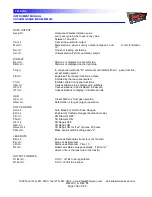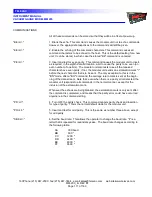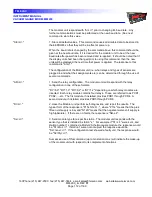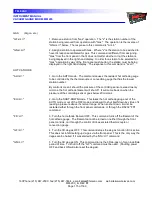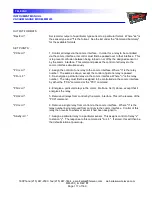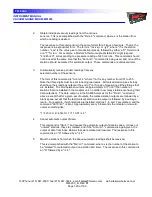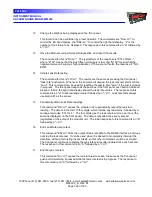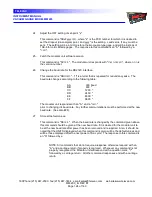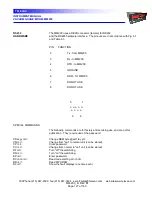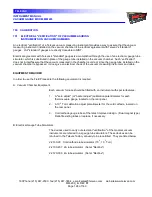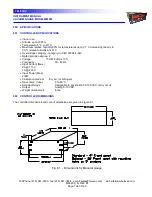
INSTRUMENT MANUAL
VACUUM GAUGE MODEL MM200
160Phone:(215) 947-2500 fax:(215) 947-7464 e-mail:sales@televac.com web site:www.televac.com
MM-200_im REV M
Page 120 of 160
TELEVAC
2.
Obtain individual vacuum readings from the various
sensors. This is accomplished with the "Rx<cr>" command, where x is the station from
which a reading is desired.
The response to this command is in the same format for all types of sensors. That is, the
response is in exponential form. The form is "n=x.xx(+ or -)yz", where "n" is the station
number, "x.xx" is the value give to two decimal places, followed by either a "U" for microns
or a "T" for torr. For example, a Model 2A thermocouple at station #2 might respond
"2=2.45+2U", corresponding to a pressure reading of 245 microns. This command should
not be used at the same time that the "Annn<cr>" command is being used, and none of the
stations should be marked for automatic output. These commands are discussed later.
3.
Automatically receive periodic readings from any
selected number of the sensors.
The form of this command is "Annn<cr>" where "nnn" is any number from 001 to 255.
Note that three digits must be sent including lead zeros. All marked stations (see below)
shall have their readings output at the end of "nnn" loops of measuring all the stations that
are installed. The time between outputs is approximately 0.11*nnn* (the number of
stations that are installed in the modular unit, no matter how many stations are having their
data outputted). The data output is in the SAME format as for the "Rx<cr>" command
above, except that for a given set of outputs, the marked station outputs are followed by a
blank space, except that the last (marked) station value output is followed by a carriage
return. For example, if eight stations are installed, stations 1, 4, and 7 are marked, and the
command "A010<cr>" is sent. Approximately every 8.8 seconds the modular unit would
output something like:
"1=1.23+3U 4=4.50+1U 7=1.10-5T<cr>"
4.
Cancel automatic output of data.
This command is "CA<cr", and causes the automatic output of data to cease. It does not
"unmark" stations, they stay marked, and if the "Annn<cr>" command is again given, the
output of data from those stations that were marked will resume. The response to this
command is an "A" followed by a "<cr>".
5.
Mark the stations from which the above automatic readings shall be received.
This is accomplished with the "Mx<cr>" command, where x is the number of the station to
be "marked" for automatic output (one station at a time). The response to this command is
an "A" followed by a "<cr>".

